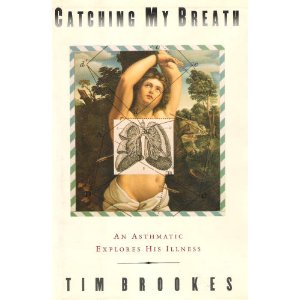A first-person attempt to understand asthma that addresses two questions: why did I suffer a near-fatal asthma attack, and why is asthma on the rise across the world as a whole? The book begins with what has been described by experts as the best account of a severe asthma attack ever written, and includes material that will be valuable for anyone suffering from this chronic disease.
Here’s a recent posting on the Mr. Asthma website:
I’ve just finished reading Catching My Breath:An Asthmatic Explores His Illness, by Tim Brookes, copyright 1994. I’d read a favorable review when it came out and had been meaning to get to it, but it took four years. Brookes is a wonderful writer with a poetic soul. If you like reading essays you might like this book. I’ve never read anything nearly as good from the layasthmatic’s POV. For a non-fiction book I found this at times extraordinarily moving. (Sometimes to the point of tears, surprisingly enough to me.) Maybe this was because of something Brookes mentions that hit home: the paradox of having to think like an asthmatic yet constantly catching myself in denial of the disease. Why is it that every time I have an attack (I’m 37) I still feel an element of disappointment, as if I’d somehow been once again conning myself that I’d been growing out of it? I keep up with my steroid inhaler like clockwork, always know when to renew my prescription, etc.- that part of my self knows the sober truth of our chronic condition. Then there are the infrequent attacks that make me realize that that ill-defined time in the “near” future when I will slowly taper off my meds and never have to use them again, because it will somehow all be over and I will have been cured – somehow and for some reason – that magic time will never come, I’m forced to admit to myself. (Perhaps there lurks in my subconscious some overweening childish sense of fundamental fairness and justice at work in the universe, that I’ve paid my dues bigtime, and that it’s only fair that I get to throw away my meds soon and it’ll all work out fine.) This is a book I borrowed via Interlibrary Loan, but I plan to track down a copy and buy it because while reading it I had that feeling that I’d found a friend who knew me in a profoundly intimate way. I read a great many books, but rarely have I felt such a sense of comfort in identification with the author. It’s a unique brand of identification, sure. I will be able to pick it up and read at random and feel I’m in the presence of one who knows. I’m somewhat surprised to realize I need this. This realization shed more light on the sort of alienation I’ve felt since childhood while in the presence of my non-asthmatic friends.(All my friends were non-asthmatic, actually.) I had a handful of painfully awkward moments in which a sudden attack amidst my chums forced me to reveal my hand. Most of you know how emotionally compounded this gets when your friends panic because it looks like you’re going to die, etc.I’d feel guilty for scaring them. I’d feel the burden of having to explain to them what the disease is, etc. Then there was a sense of stigmatization followed by another round of having to prove myself athletically or whatever. But I’ve long since digressed… michael
To order, click here.



Related Articles
No user responded in this post
Leave A Reply